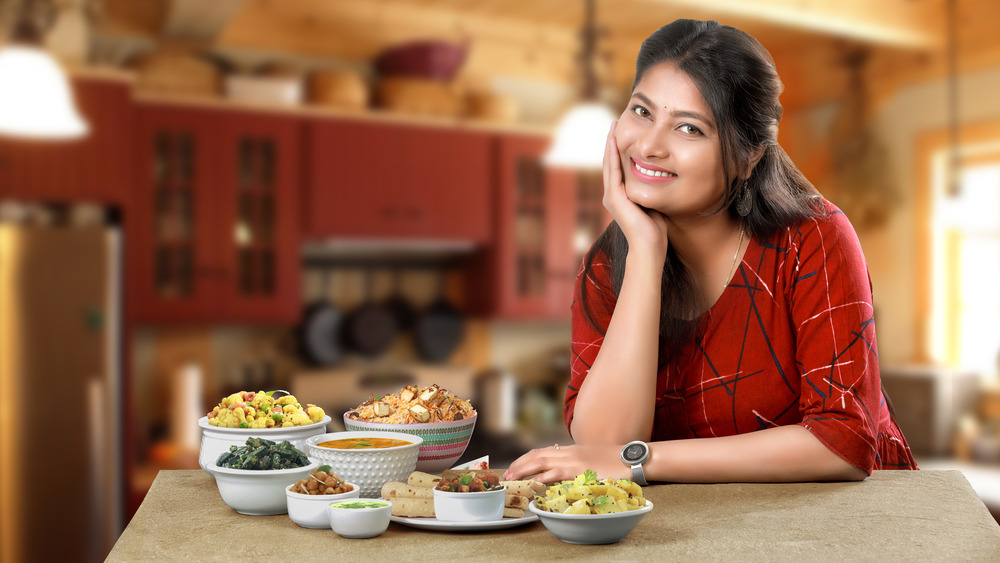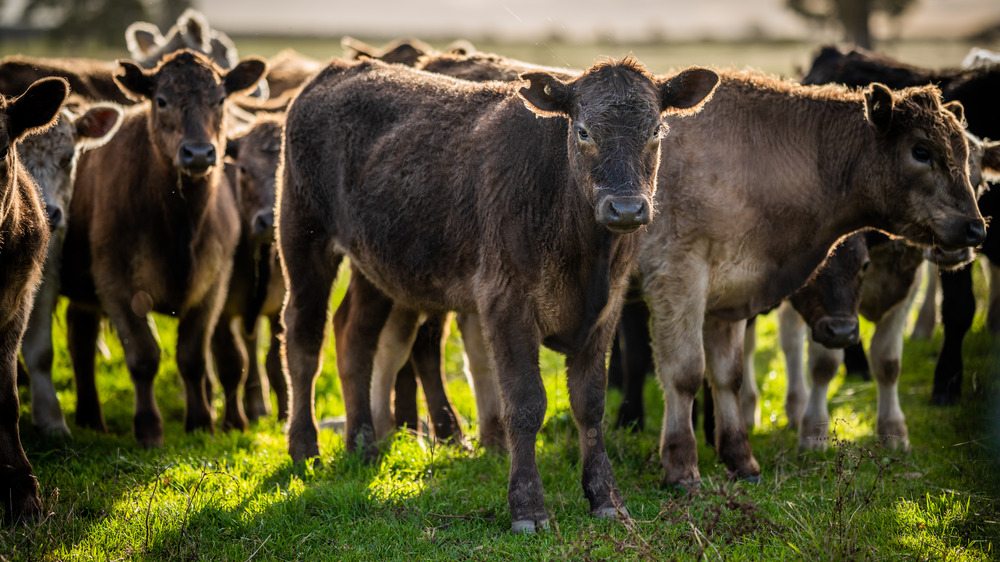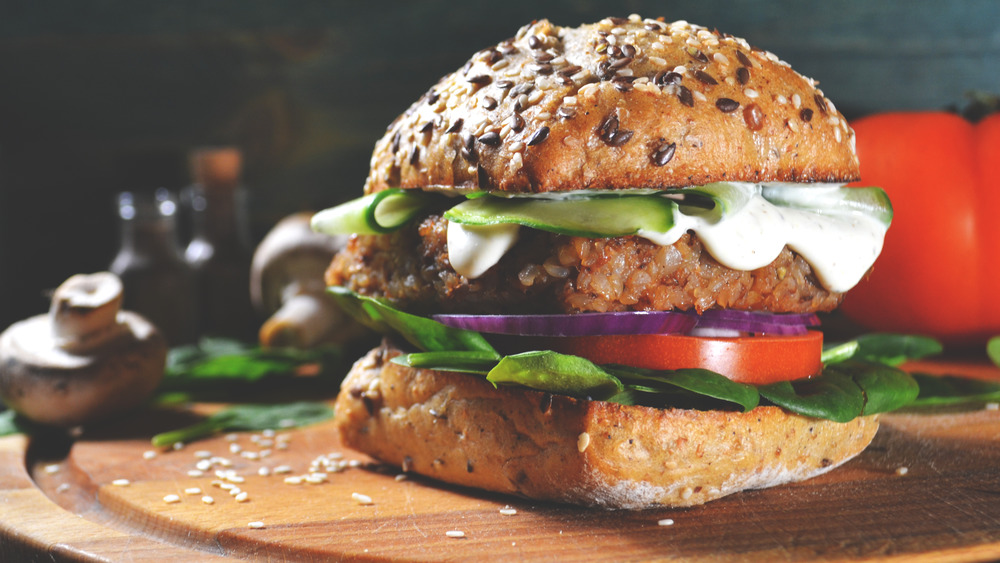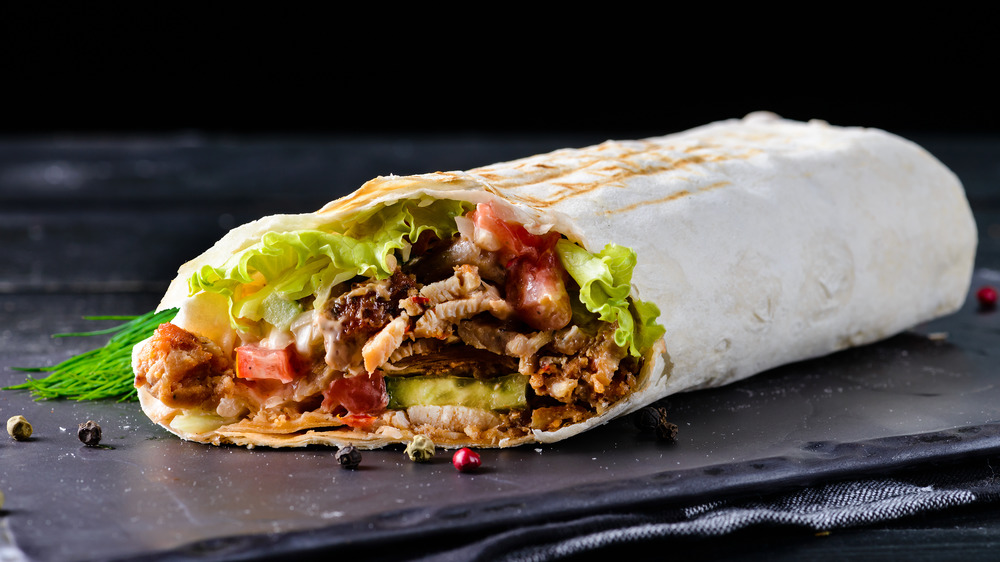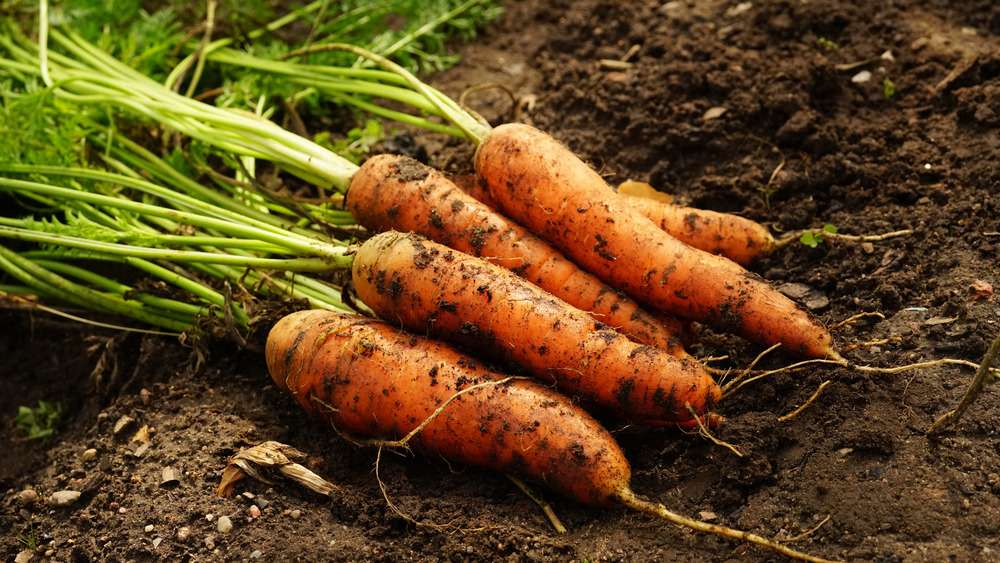The Truth About The Flexitarian Diet
If you've never considered the flexitarian diet, now may be as good a time as any. A strict vegan diet may help you live longer and benefit the planet, but veganism isn't the best solution for everyone. And that's why a dedicated omnivore, with or without burgeoning heart disease and a desire to make a difference, may embrace flexitarianism.
Not quite sure what being a flexitarian entails? We hear you. According to the Merriam-Webster dictionary, a flexitarian is "one whose normally meatless diet occasionally includes meat or fish." Essentially, this calls for being mostly a vegetarian or vegan, without having to give up meat or animal products in their entirety.
So yes, you can help the planet, lose weight, improve your metabolic health, and maybe even ward off diabetes, without having to spend your entire paycheck on vegan cheese. It's (most) of the health benefits without the deprivation. Here's a deep dive into everything you need to know about this style of eating.
Will you get enough protein on the flexitrarian diet?
There are lots of great reasons for becoming a flexitarian, but you may wonder if you'll get enough protein if you give up most of the meat in your diet. The short answer is yes. However, most of your proteins will come from other sources. "Flexitarians emphasize plant proteins and other whole, minimally processed plant foods while limiting animal products," Healthline explained. Plus, you'll still be eating meat occasionally, and thus you'll be getting animal protein.
Interestingly, most Americans are consuming too much protein from meat, and could stand to cut back. In fact, according to a 2011 paper published in the International Journal of Humanities and Social Science, Americans' meat consumption has skyrocketed. Between 2002 and 2004 meat consumption in the U.S. went up a whopping 13 percent from 192 to 221 lbs annually. If you fall into line with this average, that means you're getting about twice as much protein as you actually need.
Flexitarianism is a pretty normal way of eating for most of the world
Americans have a sort of worldwide reputation as a bunch of gluttons, and it's actually pretty easy to see why. Daily consumption of meat is not, well, normal, at least by the standards of most other nations. Around the world, it's pretty typical to eat a diet that consists primarily of vegetables, fruit, grains, and legumes, with a little red meat thrown in on special occasions.
That's not so much a lifestyle choice as it is just basic necessity. According to Frontiers in Nutrition, it takes a lot of resources to produce a little bit of meat, so it's not practical for people to devote large swaths of agricultural land to cattle, pigs, or sheep when they could use it to produce much larger quantities of vegetables or grains instead. In fact, daily meat consumption is a pretty affluent thing; out of the 190 million metric tons of red meat raised every year all around the world, about half of it is eaten by less than 25 percent of the global population. And surprise, those meat eaters are mostly Westerners.
Flexitarianism is good for the planet
Even if you don't pay a whole lot of attention to the latest in climate science, you have at least heard about the methane from cows. If you're still a bit shaky on the details, though, here they are: According to a report by the University of Adelaide, cattle are responsible for about 37 percent of the world's methane emissions.
Let's break that down just a little more: One cow produces about 430 pounds of beef, so the average American consumes roughly one cow every two years or so. That same cow emits between 70 and 120 kilograms (154 and 265 pounds) of greenhouse gas each year. So cutting your meat consumption even just in half would have a not-insignificant impact on methane emissions.
That's not the only figure that matters, either. It takes 1,799 gallons of water to produce one pound of beef, compared to just 108 gallons for a pound of corn. So if everyone just ate more corn and less beef, well, it would help conserve an awful lot of water — in addition to reducing, um, cow farts.
Encouraging widespread flexitarianism is the most realistic option
If anyone has ever tried to insist that you go full vegan or even lacto-ovo-vegetarian or else you'll be single-handedly responsible for destroying the whole world, well, you can rest assured that they're probably not right. That's mostly just because of human nature. According to a 2019 paper published by Sustainability, most people think that vegetarianism and veganism are healthy for people and the planet. But most people also think that being on a vegan diet would be boring, difficult to stick to, and expensive.
If you really look at the numbers, trying to convince large numbers of meat eaters to completely change their eating habits is not only unrealistic, but it probably won't have as much of a positive impact as just convincing more people to eat less meat. Let's put it this way: In a world where half the population eats meat the way most Americans eat meat, and half the population is vegetarian, emissions are going to be a lot worse than a world where 10 percent of the population is vegan and the other 90 percent just eats less red meat, poultry and fish.
The flexitarian diet comes with health benefits
If you guessed that the health benefits of eating a semi-vegetarian diet fall somewhere between the health benefits of a vegan diet and the non-benefits of a fully carnivorous diet, you are correct. Most studies seem to show that going vegan or vegetarian protects you from all kinds of conditions, while going semi-vegetarian has benefits too, just not to the same degree.
For example, Frontiers in Nutrition explained that the prevalence of metabolic syndrome in meat eaters is roughly 39.7 percent but only 25.2 percent in vegetarians. It's still somewhat high for flexitarians (37.6 percent) but it's at least moving in the right direction. Regarding blood pressure, the study cited by Frontiers in Nutrition was pretty small (just 26 postmenopausal women), but it did find that meat eaters had "significantly higher" blood pressure than flexitarians did.
Transitioning to a flexitarian-style of eating can even "reduce global mortality by 6–10%," per the report. As such, even if you don't think being vegan or vegetarian is for you, that doesn't mean you should just shrug your shoulders and order the 16-ounce steak. You can still claim some of the benefits of a vegan diet without actually going vegan.
You may lose weight on the flexitarian diet
If you've been considering trying a flexitarian diet, you may be doing so in the hopes of losing weight. So now let's look at the big question: If you adopt a flexitarian diet, will you actually shed some pounds?
According to Frontiers in Nutrition, the answer is a resounding ... probably. A six-month study found that overweight people who gave up animal products altogether lost more weight than people on other kinds of plant-based diets. But that doesn't mean a flexitarian diet won't work for you. A Korean study cited by Frontiers in Nutrition specifically found that postmenopausal women who ate flexitarian had "significantly" lower BMI, body weight, and percentage of body fat than those who ate a more traditional meat-based diet.
Other studies were less optimistic, however. An Adventist Health Study found that BMI in flexitarians was only a little lower than it was in traditional meat eaters (28.7 kg/m2 compared to 27.4 kg/m2). Vegetarians did better at 24.0 kg/m2, and other studies found that vegans did better still (23.6 kg/m2).
A flexitarian diet can protect against diabetes
According to the Centers for Disease Control, diabetes affects more than 34 million people, which means roughly one out of every 10 people you know is diabetic, and up to 95 percent of those people have type 2 diabetes — the kind that you develop as an adult. And what makes that happen? It's probably got something to do with diet.
The relationship between flexitarian diets and diabetes has been fairly well studied. Between 2000 and 2016, six different studies looked at this question, and the results seem to point towards flexitarianism as a positive when it comes to things like insulin and glucose. One study followed postmenopausal women who'd been eating a flexitarian diet for more than 20 years and found that their insulin and glucose levels were a lot lower than those of the meat-eating control group.
Another study found that flexitarians had a lower incidence of diabetes than other kinds of vegetarians — .92 percent compared to 1.1 percent for lacto-ovo vegetarians (vegetarians who eat eggs and diary) and 1.3 percent compared to pesco-vegetarians (fish eaters). Vegans fared a little better at .54 percent, and meat eaters fared the worst at 2.1 percent (via Frontiers in Nutrition).
The flexitarian diet is good for your heart
Like vegetarian diets, flexitarian diets are associated with better cardiovascular health. A study published in 2020 by Cambridge University Press followed nearly 11,000 people for 13 years, and found that people who consciously reduced their consumption of meat had lower cholesterol overall, which is good news — especially if you want to avoid having to take a lot of medication as you age.
Now, the cardiovascular benefits probably have something to do with the fact that flexitarians tend to weigh less than full-fledged omnivores — a lower BMI usually means a healthier heart. But there are other things at play, too. Flexitarians eat more healthy stuff like fiber and antioxidants, and they eat less saturated fat and other harmful stuff like haem Fe and N-glycolylneuraminic acid, so it's not just about what you weigh.
It's also worth noting that this study found that the rates of flexitarianism remained pretty stable throughout the 13-year study, which seems to suggest that people who adopt a flexitarian diet don't have much trouble sticking with it in the long term.
Adopting a flexitarian diet may reduce your risk of cancer
If your goal is to reduce your risk of cancer, the vegan diet is a sure bet. According to Frontiers in Nutrition, vegans have a much lower risk of developing cancer than meat eaters, but surprisingly, vegans also have a cancer-risk advantage over people who eat more traditional vegetarian diets.
Similarly, vegan diets seem to protect against prostate cancer, while vegetarian and meat-centric diets do not. Interestingly, colorectal cancer was lowest in pesco-vegetarians (people who eat fish but no other animal meat), followed by lacto-ovo-vegetarians (eggs and dairy eaters), then vegans, then flexitarians, then meat eaters.
To be fair, a lot of studies compare vegans, vegetarians, and meat eaters but exclude flexitarians, possibly because flexitarianism is relatively a new idea and there really isn't any consistency as far as which and how much meats individual flexitarians will eat. Nevertheless, Healthline explained that "incorporating more vegetarian foods by eating flexitarian may reduce your cancer risk."
Eating small amounts of meat is likely healthier than eating plant-based meat
In the last few years, plant-based "meat" has come of age. Veggie burgers are no longer pasty things that look vaguely like beef — at least not all of them are. Now you can get a veggie burger that has the look and texture of real meat. Although you may think trading the meat flavor for healthier ingredients is a good trade-off, you should know that "plant based" doesn't necessarily mean "healthy."
According to a 2019 study published in Nutrients, eating small amounts of meat may actually be better for you than eating plant-based meat substitutes. Substitutes tend to have less fat and more fiber than the real thing, but that's kind of where the benefits end. Plant-based substitutes are also higher in carbohydrates and sugar, and a lot higher in sodium. They are also lacking in the same vitamins and minerals that real meat has, like iron, B12, and zinc. In other words, the people who are making meat substitutes aren't really trying to make them nutritionally similar to meat, and that may be a problem for people who are seeking to replace animal products with such substitutes.
For some people, flexitarianism may be a sign of unhealthy eating
One 2018 study had a less sunny outlook on flexitarianism. The authors argued that people who adopt flexitarian diets tend to do it because they want to control their weight, which means they may not be taking in enough calories and they may not be paying a lot of attention to the nutritional quality of the foods they eat.
The study found that flexitarians were more likely to have "maladaptive eating habits," like undergoing periods of semi-starvation followed by bingeing. These kinds of eating patterns put people at greater risk of developing eating disorders. And flexitarians seemed to be especially at risk for this — carnivores and all other types of vegetarians weren't nearly as likely to develop unhealthy eating habits as their flexitarian counterparts. That is not to say that flexitarianism always leads to disordered eating. It's just that it's also an eating style that seems to be more attractive for people who already have a pretty unhealthy relationship with food.
If you are struggling with an eating disorder, or know someone who is, help is available. Visit the National Eating Disorders Association (NEDA) website or contact NEDA's Live Helpline at 1-800-931-2237. You can also receive 24/7 Crisis Support via text (text NEDA to 741741).
A flexitarian diet can be enjoyable even for diehard omnivores
Convincing the masses to cut back on their consumption of meat may sound like a difficult task, but it's not actually as challenging as the alternative. As it turns out, when you offer meat eaters a choice between a strict vegetarian dish and a dish that's just a little lighter on meat, they tend to prefer the lighter-meat version. That's not super surprising, but the larger question is, are people as happy with the light meat version as they would be with the full-on carnivore option?
According to a study conducted in a university cafe, the answer is yes — with some caveats. Researchers found that a mix of vegetables and legumes made diners happier than legumes or vegetables alone, and generally speaking the spicier the dish was the more it was enjoyed. So it's not necessarily easy to make a carnivore enjoy a flexitarian meal, but with a little culinary creativity it's possible to not only convince someone to eat less meat, but to make those meat-light meals delicious.
There is some long-term evidence that supports the flexitarian way of life
Flexitarianism is a relatively new word, but it's not a new idea. We've already established that a lot of people around the world follow a semi-vegetarian diet by default, but does this actually help anyone's health? You can't really compare all semi-vegetarians worldwide, though, because a semi-vegetarian diet isn't necessarily always healthy, depending on where you live, what kinds of food you have access to, and whether or not you are food secure or insecure. But it is true that the longest lived people in the world eat flexitarian diets, so that should tell you something.
According to a report published in the American Journal of Lifestyle Medicine, there are five "Blue Zones" around the world where people tend to live to be at least 100 years: Okinawa, Japan; Ikaria, Greece, Costa Rica, Nicoya, Sardinia, Italy, and (believe it or not) Loma Linda, California.
Diet isn't the only thing that seems to contribute to these people's longevity, but it's one of nine different factors researchers have identified. People in Blue Zones eat a lot of legumes, and they eat maybe 3 or 4 ounces of meat (usually pork) around five times a month.
Can the world go flexitarian?
Many people want and need to become healthier, and we need to do more to protect the planet. The flexitarian diet seems to be a way to accomplish this, right? So what's the problem?
According to an article published by Agricultural Economics Research Institute, there are multiple problems. First, we've known for a long time that too much meat is bad for us and bad for the environment, and animal welfare on factory farms is abysmal. But on the flipside, wealthy nations eat lots of meat, and as a result meat consumption has become sort of symbolic of affluence and prosperity. This means countries have a tendency to consume more animal products as they become more westernized, and those kinds of ideals are kind of hard to undo.
There is some hope; researchers found that there are already trends towards reduced meat consumption in European nations like the Netherlands. But can America do it? The researchers suggested policy changes, but there isn't much interest in making such policies, according to the report. That could change, of course. And more and more Americans (maybe even you) are already becoming flexitarians.



